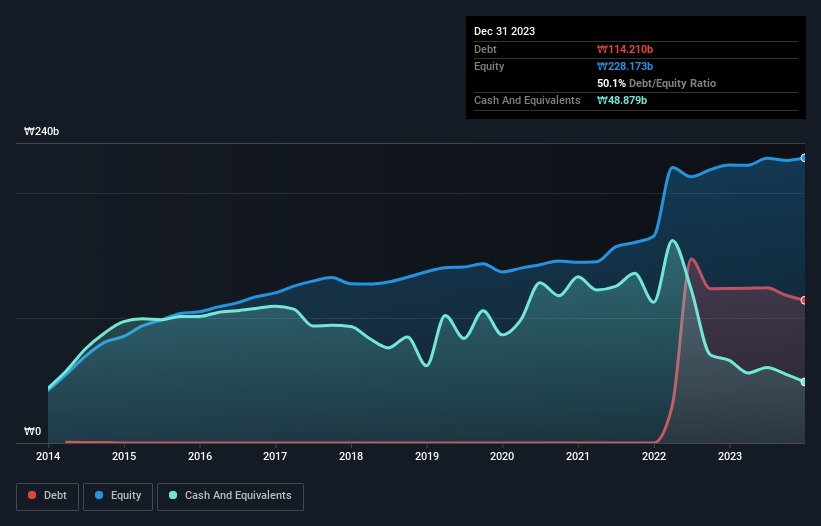- South Korea
- /
- Entertainment
- /
- KOSDAQ:A123420
Health Check: How Prudently Does Wemade Play (KOSDAQ:123420) Use Debt?
The external fund manager backed by Berkshire Hathaway's Charlie Munger, Li Lu, makes no bones about it when he says 'The biggest investment risk is not the volatility of prices, but whether you will suffer a permanent loss of capital.' So it might be obvious that you need to consider debt, when you think about how risky any given stock is, because too much debt can sink a company. We can see that Wemade Play Co., Ltd. (KOSDAQ:123420) does use debt in its business. But the real question is whether this debt is making the company risky.
When Is Debt A Problem?
Debt assists a business until the business has trouble paying it off, either with new capital or with free cash flow. Part and parcel of capitalism is the process of 'creative destruction' where failed businesses are mercilessly liquidated by their bankers. However, a more frequent (but still costly) occurrence is where a company must issue shares at bargain-basement prices, permanently diluting shareholders, just to shore up its balance sheet. Of course, plenty of companies use debt to fund growth, without any negative consequences. When we examine debt levels, we first consider both cash and debt levels, together.
View our latest analysis for Wemade Play
What Is Wemade Play's Net Debt?
As you can see below, Wemade Play had ₩114.2b of debt at December 2023, down from ₩123.7b a year prior. However, because it has a cash reserve of ₩48.9b, its net debt is less, at about ₩65.3b.

How Strong Is Wemade Play's Balance Sheet?
The latest balance sheet data shows that Wemade Play had liabilities of ₩19.6b due within a year, and liabilities of ₩143.8b falling due after that. Offsetting these obligations, it had cash of ₩48.9b as well as receivables valued at ₩10.7b due within 12 months. So it has liabilities totalling ₩103.8b more than its cash and near-term receivables, combined.
This deficit is considerable relative to its market capitalization of ₩107.2b, so it does suggest shareholders should keep an eye on Wemade Play's use of debt. This suggests shareholders would be heavily diluted if the company needed to shore up its balance sheet in a hurry. The balance sheet is clearly the area to focus on when you are analysing debt. But you can't view debt in total isolation; since Wemade Play will need earnings to service that debt. So if you're keen to discover more about its earnings, it might be worth checking out this graph of its long term earnings trend.
In the last year Wemade Play had a loss before interest and tax, and actually shrunk its revenue by 9.2%, to ₩122b. That's not what we would hope to see.
Caveat Emptor
Importantly, Wemade Play had an earnings before interest and tax (EBIT) loss over the last year. Indeed, it lost ₩436m at the EBIT level. When we look at that and recall the liabilities on its balance sheet, relative to cash, it seems unwise to us for the company to have any debt. So we think its balance sheet is a little strained, though not beyond repair. Surprisingly, we note that it actually reported positive free cash flow of ₩2.4b and a profit of ₩4.3b. So if we focus on those metrics there seems to be a chance the company will manage its debt without much trouble. There's no doubt that we learn most about debt from the balance sheet. But ultimately, every company can contain risks that exist outside of the balance sheet. For instance, we've identified 4 warning signs for Wemade Play (1 is concerning) you should be aware of.
If you're interested in investing in businesses that can grow profits without the burden of debt, then check out this free list of growing businesses that have net cash on the balance sheet.
Valuation is complex, but we're here to simplify it.
Discover if Wemade Play might be undervalued or overvalued with our detailed analysis, featuring fair value estimates, potential risks, dividends, insider trades, and its financial condition.
Access Free AnalysisHave feedback on this article? Concerned about the content? Get in touch with us directly. Alternatively, email editorial-team (at) simplywallst.com.
This article by Simply Wall St is general in nature. We provide commentary based on historical data and analyst forecasts only using an unbiased methodology and our articles are not intended to be financial advice. It does not constitute a recommendation to buy or sell any stock, and does not take account of your objectives, or your financial situation. We aim to bring you long-term focused analysis driven by fundamental data. Note that our analysis may not factor in the latest price-sensitive company announcements or qualitative material. Simply Wall St has no position in any stocks mentioned.
About KOSDAQ:A123420
Flawless balance sheet and good value.
Market Insights
Community Narratives


Recently Updated Narratives

TAV Havalimanlari Holding will fly high with 25.68% revenue growth


Fiducian: Compliance Clouds or Value Opportunity?


Q3 Outlook modestly optimistic
Popular Narratives


MicroVision will explode future revenue by 380.37% with a vision towards success


The company that turned a verb into a global necessity and basically runs the modern internet, digital ads, smartphones, maps, and AI.



